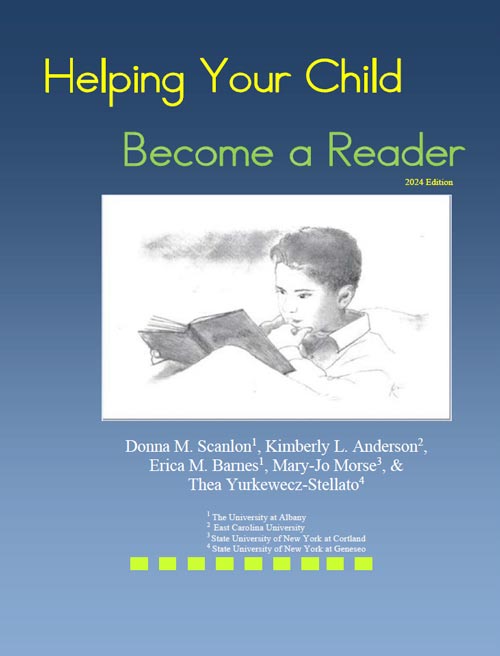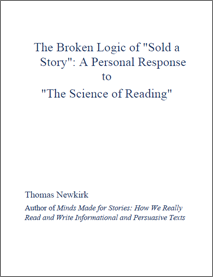Perspectives on the Sciences of Reading
We created this section to advance the discussion of the sciences of reading, including perspectives that diverge from what we have suggested in our monograph, Fact-checking the Science of Reading. Such a space for discussion is a way of enacting our suggestion, at the end of the monograph, that we stay at the table to “continue the conversation”—to engage in rather than retreat from diverse perspectives on what the research suggests (or does not suggest) about reading theory, practice, and policy.
In order to post something on Perspectives on the Sciences of Reading, send a link to your proposed entry to Rob (rob.tierney@ubc.ca) or David (ppearson@berkeley.edu), along with an explanation for what your piece would add to this important conversation about reading theory, research, practice, and policy. Postings might be spurred by our fact checking or involve independent discussion of the Science of Reading. Especially welcome are ideas about understanding different perspectives, including differences and agreements, and raising possibilities for reaching consensus or not. It would be ideal if it included ongoing questions and perhaps suggestions for designing research that might add insights to important issues.
A decision to post a commentary will depend on our view of its significance and relevance to issues we have addressed in our own discussions of the Science of Reading. We are not set up, either logistically or financially, to publish any and everything that comes our way. And we reserve the right to respond (or not respond) to any post we might publish.
Perspectives
Mora, J. K. (2025). A Multilingual Educator Fact-Checks Science of Reading Claims.
As Rob T. and P. David state:
By our own admission, our monograph Fact-checking the Science of Reading” fails to provide a substantive discussion of examining the ramifications of the claims emanating from the Science of Reading for meeting the needs of multilingual learners. Hence, we were heartened to have Jill Kerper Mora ask us to consider for posting her critique.
As a reminder, we do not require that guest commentators on literacyresearchcommons.org agree with our understanding and interpretation of research and policy matters—only that they present a useful and important analysis of these often fraught and complex issues. We are as pleased to host Jill’s perspective as we were Claude Goldenberg’s, knowing that they do not agree with one another on the research bases for polices for multilingual learners. We leave it to you, our readers, to weigh differences (and commonalities) in their perspectives.
As Jill Kerper Mora states:
The purpose of my analysis of Fact-checking the Science of Reading: Opening up the Conversation (Tierney & Pearson, 2024) is to provide the perspective of a multilingual educator and researcher on the adequacy of the Science of Reading (SoR) as a research base for language and literacy instruction for multilingual learners. Specifically, I address my critique of SoR’s applicability as the predominant knowledge base for literacy pedagogy for emergent bilingual learners whose English language proficiency is developing across the span of elementary school grades. Literacy researchers recognize that curriculum and instruction must accommodate the sociocultural and cognitive differences between students who are learning to read first in a second language in which they are not yet orally proficient and those who are learning to read a second language after acquiring literacy in their native language. The same assumptions on which literacy instruction is based for monolingual English-speaking students do not apply universally to emergent bilingual learners whose English-as-a-second-language proficiency is developing across the span of elementary school grades. Research provides an account of the acquisition of reading in a second language context that considers aspects of the reading process that are language-dependent and text-specific rather than universals.
In my opinion, SoR advocates tend to discount the transdisciplinary research on the literacy acquisition trajectory of multilingual learners. As a matter of translation of research into policy action, it is reasonable to expect teachers to adhere to and align with curriculum standards that are clearly articulated in terms of students’ expected learning outcomes and behaviors. However, it is not reasonable as a matter of law to require teachers to adhere to a particular body of research. A body of research literature cannot be used as a regulatory schema to mandate “adherence” or “alignment” or to sanction teachers for non-alignment, not to the research itself, but to someone’s interpretation of the research. This is especially true when scholarly research that is specific to the learning characteristics and needs of multilingual learners is marginalized. I argue that literacy education for multilingual learners must be based on the full range of relevant multidisciplinary research.
Reinking, D.P., Hruby, G.G., & Risko, V. (2023). Legislating phonics: Settled science or political polemics? Teachers College Record, 125, 104-123.
When the two of us were in the middle of writing our Fact-checking monograph, we took note of this article as soon as we learned about it. We found it helpful on two counts: (a) it confirmed several of the claims we were in the process of constructing, and (b) it offered insights we had not yet discovered on our own. Overall it added to our motivation to press forward with the manuscript. One of the insights we found most valuable was a distinction between what the research says in journals and books (e.g., of course we have to teach phonics as a part of a comprehensive approach to reading instruction) and what the research says in the media and policy documents (e.g., the failure to teach phonics is the real problem, so let’s take care of that first).
Goldenberg, C. (2024) What “Science of Reading” are Tierney and Pearson actually fact-checking?
In his critique of our Fact-Checking book, Claude Goldenberg shares several concerns about the book, claiming that…
- We convey the sense that there is little if any consensus about how to teach reading.
- Our alleged claims emerging from our reading of the Science of Reading are simply extreme and not well-supported versions of “science of reading” (SOR) claims.
- We have assigned these unwarranted claims to vague straw persons rather than identifiable individuals or groups.
Resources
The resource section of Literacy Research Commons is intended to extend the conversation about policies and practices that are grounded in research about literacy development, learning, and teaching. If we post a resource, it means that we believe the resource is worthy of your study and examination. It does not necessarily mean that we agree with each and every idea within the resource. Indeed, in the spirit of genuine debate, we will, from time to time, post resources that are in tension with our own views on literacy research and practice. For some, not all, resources we also provide our own introduction, as a way of indicating why we think this particular resource deserves special attention.

Helping Your Child Become a Reader
Donna M. Scanlon, Kimberly L. Anderson, Erica M. Barnes, Mary-Jo Morse, & Thea Yurkewecz-Stellato
Learning to read and write is exciting for children. The goal of this booklet is to provide caregivers with some information about how they can help young learners become readers and writers. We address some of the common questions and concerns that caregivers pose.

The Broken Logic of "Sold a Story": A Personal Response to "The Science of Reading"
Thomas Newkirk
